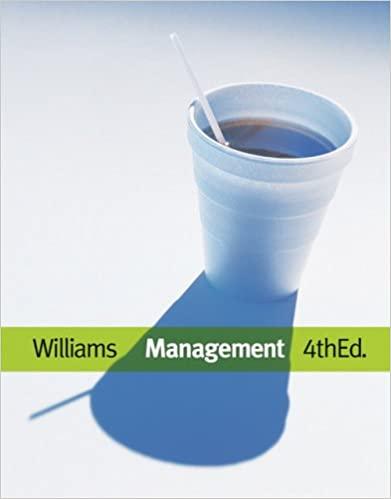Question
Q1:How would this be explained in the witness box, how would this look on the front page of tomorrows newspaper, and how would I explain
Q1:How would this be explained in the witness box, how would this look on the front page of tomorrows newspaper, and how would I explain this to my family? This is the three quick tests applies when an executive may not have time for a long ethical assessment process and he/she needs to respond quickly to an ethical crisis. A- True B-False Q8:A conflict is actual when a personal interest leads a person to act against the interests of an employer or another person whose interests the person is obligated to serve. One the other hand, a situation constitutes a potential conflict of interest when there is the possibility that a person will fail to fulfill an obligation to act in the interests of another, even though the person has not yet done so. A-True B-False Q12:What are the kinds of conflict of interest?
A-Exercising biased judgment, engaging in direct competition, misusing a position, and violating confidentiality.
B-Exercising biased judgment, engaging in direct competition, and stealing from the company.
C-Misusing a position, violating confidentiality and benefiting from the companys perks.
D-None of the above. Q13 :Kohlberg's moral development stages in humans states that:
A-At the earliest phase the child defers to physical superiority, and does not understand that others have consciousness and desires. The second phase has proper action serving to satisfy the persons own needs. Subsequent phases progress through loyalty and affection within the sphere of immediate family and friends. Then, there is a quantum lift in moral understanding that has the person trying to develop impartial points of view, using self justified moral principles. At last stage is that of seeing moral principles as being universal and consistent.
B-A child goes into two phases. The first phase, a child will learn right and wrong based on rewards punishments. The second phase, a child acquired his/her moral understanding through applying the morals of his family members.
C-A child has three stages of moral development. First, he/she accepts the moral understanding of his family. Second, he/she acquires moral principles from school and friends. Third, he/she develop his/her personal moral principles based on what he/she acquired from family and school.
D-None of the above. Q15:What was/were the reasons of the collapse of Enron?
A-The conflict of interests between the two roles played by Arthur Anderson, as auditor but also as consultant to Enron, and the lack of attention shown by members of the Enron board of directors to the off-books financial entities with which Enron did business.
B-The bad economy at that time.
C-The arrogance of the top managers and their beliefs that they do no wrong.
Step by Step Solution
There are 3 Steps involved in it
Step: 1

Get Instant Access to Expert-Tailored Solutions
See step-by-step solutions with expert insights and AI powered tools for academic success
Step: 2

Step: 3

Ace Your Homework with AI
Get the answers you need in no time with our AI-driven, step-by-step assistance
Get Started


